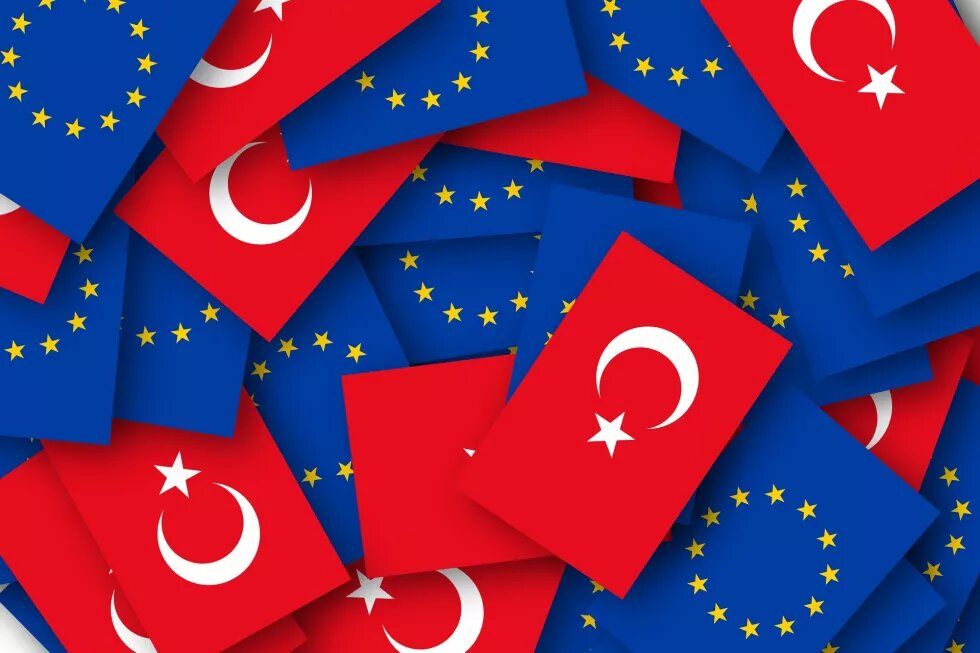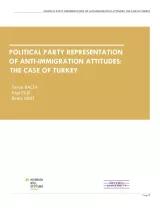
Under the title “The Turkey-EU Cooperation on Migration – Charting a future course?” our Heinrich Böll Stiftung Istanbul office, together with the Heinrich Böll Stiftung Thessaloniki Migration hub and their partner-organisations, The Economic Policy Research Foundation (TEPAV) and the Association for Migration Studies (GAR), organised a public workshop and closed roundtable discussion on January 12, 2023 in Ankara.

Over 7 years ago the EU-Turkey Statement of March 18 created a mechanism that until today has not fulfilled what both parties had hoped for. Yet, it is perceived to be a success – even a blueprint for further cooperation agreements with other third states - by some in the European Union. Human Rights organisations on both sides heavily criticised the agreement from the beginning until today.
In light of recent developments in Turkey as well as in the EU and its Member States, we discussed the future of the EU-Turkey Statement and potential ways to improve the migration policies in and towards Turkey. In a public panel moderated by Didem Danış from the Galatasaray University and joined by three experts on the topic we shed light on relevant questions. The public panel was followed by a closed workshop with representatives from all democratic parties in Turkey and a Member of Parliament from Germany in order to discuss concrete policy concepts and different scenarios for the future.
Main consequences of the EU-Turkey Statement
The Heinrich Böll Stiftung Istanbul office had recently translated the paper “Beyond the Crisis Mode of the EU-Turkey Refugee Agreement” by Dr. Olaf Kleist from the DeZIM Institute Berlin into Turkish. In order to publicly launch this paper and to lay the ground for the discussion, Dr. Kleist was invited to present the main findings and recommendations of his policy-paper.
He did so by giving a brief recap of the history of the EU-Turkey agreement first, followed by an overview of the main consequences of the agreement.
He reminds the audience of the situation back in 2015 with the sudden rise of arrivals in Europe, when Germany was characterised by a “Summer of Welcome” before people on the move started being stuck along their rout due to the closing of the so-called Balkan corridor. The EU then tried to work towards regaining control of its Southeastern Schengen borders and reducing or even stopping the flows of people, also in reaction to growing public local hostilities. On the other side, Turkey among other goals simply needed resources and support for the unprecedented number of asylum seekers who had arrived in the country, mainly from Syria. Dr. Kleist explained that none of the EU’s goals were achieved because of the agreement and most of them weren’t achieved at all. Why the number of new arrivals to the EU had dropped indeed, he named other factors, such as the closure of the Balkan route and repressive border policies to be the main reason behind this drop. He further elaborated how the 1:1 mechanism failed: only 2.140 people were deported back to Turkey and 28.300 were resettled to the EU under the scheme. In fact Kleist analysed the Humanitarian Assistance to Turkey to be the only real positive aspect of the agreement. He continued listing negative consequences, such as the EU’s dependence on Turkish border control, the undermining of EU values and an overall shift towards securitisation and away from Human Rights.
Legal aspects of the agreement
His presentation was followed by an input by Dr. Christina Velentza (IPC-Mercator Fellow) on the “Implications of the Agreement as an Extra Legal Text Regarding International Law: The Greek Perspective”. Dr. Velentza referred to the legal aspects of the agreement. Her assessment, while focusing on other aspects, fitted well into what was presented before, since she also was critical of the agreement and its effects. She elaborated how it was initially supposed to be temporary, and how it nevertheless remains in place, with many negative consequences, such as the legitimisation of detention on the Aegean islands on the Greek side. According to Christina Velentza, the agreement follows the Australian model and undermines Human Rights. The formal designation of Turkey as save third country for asylum seekers reaching Greece is something she further explained to be highly problematic.
The Turkish political parties on refugees
Under the title “Refugee issue and Turkey’s domestic politics – Expectations and trajectory post 2023 elections”, Professor Deniz Sert from Özyeğin University presented the findings of the latest study she co-authored with Ezgi Elçi and Evren Balta. She stated that up until the 2019 elections the arrival of almost 4 million refugees interestingly did not have an effect on elections and political campaigns in Turkey. She explained further, that the political elite acted in a rather responsible way, which is why there was neither a “summer of welcome” nor a societal uproar among Turkish society with regard to migrants in the country. For the study, which Professor Sert had co-authored, “Political party representation of anti-immigration attitudes: The case of Turkey” the researchers analysed over 900 political speeches between the years 2011 and 2021. They interestingly see no major differences in the language of the different parties in Turkey since they all speak of migrants as of “guests, brothers and sisters”. At the same time, none of the parties offer any specific solution to the challenges with regard to migration, while being critical towards the EU-Turkey agreement. Professor Sert critically commented that migrants are always discussed to be Syrians and all those from other countries would remain unseen in the public debate. Furthermore, she stated that irregular migration and protection should be discussed separately and in general migration should be considered with a long-term, non-partisan and non-politicised perspective rather than being in the focus of heated pre-election-debates.
Support to the local level and other suggestions
After all discussants had given their presentations, a lively Q&A session and an interesting discussion with the engaged audience unfolded. It was stated that the EU’s financial support to Turkey should be directed more towards the local level and funds should be given to municipalities, since they would be responsible for refugees and therefore in need of the resources on the ground. The EU should further focus more on root causes of displacement, rather than externalisation. The EU-Turkey agreement should not be seen as a solution and the EU should stop following the externalisation approach, leaving border control to third countries, such as Turkey, but also Libya, or Morocco. Finally, one participant rightly stated that migration shouldn’t be the only topic of interest between the European Union and its Aegean neighbour, but there are many more common and relevant issues, which should not be forgotten.


